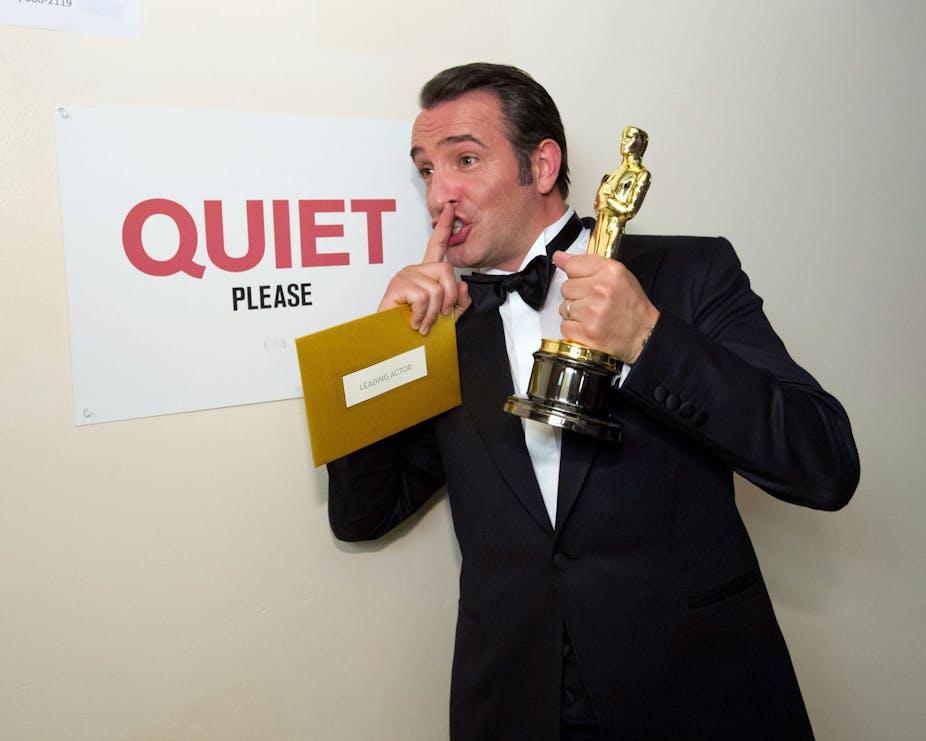For some they’re tearful, for others fearful; and for those of us watching they’re sometimes too much to bear.
Oscars acceptance speeches offer a microcosmic view into a microcosm: a small world writ large that reveals so much about Hollywood – another small world writ large.
Since 2010, the speeches have been even more microcosmic, with organisers insisting on a 45-second limit. This weekend will mark the fifth year of this stricter regime, which is still far more lenient than what may have been needed for Billy Wilder, whose 1961 speech for The Apartment was ten words long; or for Alfred Hitchcock, whose 1968 speech (Thank you. Very much indeed.) was a masterclass in brevity.
Tighter time limits may reduce the number of pratfalls, pointed putdowns, and charismatically intense moments. To the joy of most viewers, though, they cannot eliminate them altogether.
Popular views of these speeches fit in neatly with broader views about what celebrities are good for. Successive generations of media have fed us stories about celebrity figures as objects both of our envy and of our judgemental scrutiny.
No surprise, then, that commentary on the acceptance speeches rivals commentary on the awards themselves — this has grown conspicuously truer with the advent of social media and web 2.0 news services.
And no surprise that the commentary on Oscars acceptance speeches is so exacting in its criticisms of performance. As the journalist Sharon Waxman wrote 15 years ago:
Forty-five seconds. One billion viewers. Your moment of glory.
Most people blow it.
Tom Shone’s reply to this line is more sympathetic:
Anyone who thinks you can get up on stage at the Dolby Theater in front of 40 million people, take an atomic blast of approval from a select audience of your peers, and then fake your response, is very much mistaken. It peels you like an onion.
Take Halle Berry’s Best Actress speech in 2002 for Monster’s Ball. Crocodile tears? It didn’t seem so:
Really, you could a make a version of the same argument about any successful public awards ceremony. Take the Brownlow medal, for example. Sure, footballers are not trained in elocution. Sure, we cannot reasonably expect they will enlighten us about matters unfootball. None of that stops millions of critically scrutinising gazes from falling on these heroes of the weekly fight club.
And like the Brownlows, there is a clear sense that media critics and home viewers prefer Oscars acceptance speeches that stay on-topic. We want our movie starts to talk principally about the business of being movie-stars.
That allows intense criticism of the business, as with Ingrid Bergman’s 1975 speech, balancing sharp with gracious when she received Best Supporting Actress for Murder on the Orient Express.
It can charm shamelessly. Roberto Benigni took that to an outrageous – some might say “bonkers” – extreme in (and especially around) his 1999 speech, accepting Best Foreign Language Film for Life Is Beautiful (1998):
The speech can certainly focus on all those people the award omits to recognise, as in Dustin Hoffman’s 1980 speech accepting Best Actor for Kramer vs Kramer. Many hold this to be the best Oscars speech of all time:
Why was it so highly rated? Hoffman blended self-deprecation, sharp critique of the film-star myth, and plenty of wit to deliver a speech for the unsung heroes of Hollywood. No film-maker could produce a more compelling version of a speech about film-making.
One thing an acceptance speech cannot do, though, is stretch the “unsung heroes” acknowledgements beyond a broadly understood sense of why this film star is up on stage talking to us right now. Popular opinion turns very quickly against speeches that bore by listing people whose relevance is not blindingly self-evident.
Another common sin is when film stars discuss the people in their families but fall short of sublimely nuanced eloquence in doing so. Thus the judgement on well meaning but poorly executed nods to family can be especially unsympathetic, as Ben Affleck found last year with his widely mocked gratitude to wife Jennifer Garner: “I want to thank you for working on our marriage for 10 Christmases.”
On the one hand, celebrity culture means it is perfectly legitimate to talk about family in such speeches – to talk about the characters routinely caught up in celebrity news and photographs. On the other, celebrity culture does not educate an understanding that private lives and private relationships are equally messy, equally amateurish, for all who live them.
Working life has generally been an upward curve for Affleck, since his single line cameo as a jock in the original [Buffy the Vampire Slayer movie](http://en.wikipedia.org/wiki/Buffy_the_Vampire_Slayer_(film) (1992). For such successful stars, there is a very large public ready to adore and lampoon every move. Why would they bother to say what they really think in such a forum?
But on the other hand, what harm does all the schadenfreude actually cause them anyway? The votes are already in, the movie already released.
Why not say whatever they want to?
See further Oscars 2014 coverage on The Conversation.

